- Home
- David Gemmell
01 - Lord of the Silver Bow Page 12
01 - Lord of the Silver Bow Read online
Page 12
That was another reason Andromache could not go back. Of all the women on Thera Kalliope was the most content there. Her loathing of men meant the island was the one place in all the world where she could be at peace, where her laughter could ring out and her soul soar free. Andromache’s return and the consequent turmoil could lead to Kalliope’s expulsion from Thera.
A cool wind blew over the sea, and Andromache gathered her cloak about her. Time drifted by. She knew she should return to Kygones’ palace, but she was loath to forsake the freedom the beach offered.
“You do not belong here,” said a man’s voice. She glanced around, an angry retort on her lips. Then she saw it was the storyteller. In the moonlight his ugliness seemed almost otherworldly. She could imagine Dionysian horns sprouting from his head.
“Where do I belong?” she countered.
“Why, in one of my tales, of course. My friend was right. You do look like a goddess. You’re not, are you?” He sat down on a nearby rock. The moon was full now, and she saw that his face, while ugly, had a boyish charm. “I am Odysseus,” he said. “And you haven’t answered my question.”
“Yes, I am a goddess,” she told him. “I’ll leave you to guess which one.”
“Artemis the huntress.”
“Not Aphrodite, then? How disappointing.”
“I don’t know much about how the gods really look,” he admitted, “but I think the goddess of love would have bigger tits. And her eyes would be warm and beguiling. No, I think Artemis suits you. Tell me you can shoot a bow.”
Andromache laughed. “I can shoot a bow.”
“I knew it! One of those flimsy Egypteian pieces or a real Phrygian bow of horn and wood and leather?”
Andromache smiled. “On Thera we had both, and, yes, I preferred the Phrygian.”
“I have a bow no one else can string,” he told her. “It makes me laugh to see strong men grow red in the face trying. It is a powerful weapon. I once shot an arrow into the moon. It had a rope attached, and I used it to draw my ship from the beach.”
“That was a long rope,” she observed.
Odysseus laughed. “I like you, lass. Where are you really from, and what are you doing here, walking among whores and sailors?”
“How do you know I am not a whore?”
“If you were a whore, you still wouldn’t be here, for there’s not a man could afford you. Well, save Helikaon, perhaps. So what are you?”
“How would you define a whore?” she countered.
“Ah, a game. I love to play games. Very well… what is a whore? A woman gifted with the talent to make a hard man soft; a priestess of Aphrodite, the delight of sailors who miss their wives and their homes.”
“It is not a game,” Andromache said sharply. “A whore is a woman who offers her body to a man she doesn’t love for copper, trinkets, or gifts. Not so?”
“I prefer my version, but then, I am romantically inclined. However, yes, both definitions are sound,” he agreed.
“Then I am a whore, for my body is being offered to a man I do not love for riches and security,” she said.
“Ah,” cried Odysseus. “You should have asked what is the difference between a king’s daughter and a whore. I would have answered: ‘The price.’ So who is the lucky fellow?”
Andromache stared into his ugly face and considered telling him to be on his way. Yet there was something comfortable about his company, and she felt at ease with him. “Hektor of Troy,” she said at last, and saw his eyes widen.
“You could do worse. A good man is Hektor.”
“By which you mean he drinks wine until he falls over, belches at the table, and rushes off to fight wars and gain glory. May the gods save us all from good men. Are you married, Odysseus?”
“I am indeed. I am also the most fortunate man on the Great Green, for my wife is Penelope. And she loves me.” He chuckled. “Whenever I say that, I am filled with wonder. I find it incomprehensible that she should.”
“Then you are, as you say, fortunate. But then, I expect sailors only marry for love. It makes them far richer than kings.”
“Well, yes, I suppose it does. I should point out, though, that I am a king.”
“Who shoots arrows into the moon?” she said, smiling.
“I know I don’t look like a king, but I truly am. My kingdom is the isle of Ithaka, and Penelope is my queen. And before you ask, no, we did not marry for love. My father arranged the match. We only met on our wedding day.”
“And you fell in love the moment your eyes met, I suppose?”
“No. I think she loathed me on sight. Not hard to see why. The first few months were… shall we say, scratchy. Then I fell ill with a fever. Almost died. She nursed me. Said I talked in my delirium. She never told me what I said, but somehow, after that, things were different. We started to laugh together, then take long walks along the cliffs. One day…” He shrugged. “One day we just realized we loved each other.”
Andromache gazed at the ugly man, seeing him anew. There was a touching honesty behind the tall tales and a charm that slipped almost unnoticed past her defenses.
“You saw the attack on Helikaon?” he said suddenly.
For a moment she did not know what he meant, then remembered the knifeman rushing forward. “The fight, yes. Helikaon is the man with the long black hair?”
“He is a close friend of Hektor. He could tell you far more about him than I could.”
“Why did the assassin want him dead?”
Odysseus shrugged. “Too pleasant a night to spend telling boring stories about traders and pirates and old grudges. Ask me something else.”
“Was Helikaon the friend who said I looked like a goddess?”
“Yes. Never seen him so smitten. Having met you, of course, I can understand it.”
She leaned toward him. “Let us not play this game any longer, Odysseus. I know what I am: tall and plain and a breeding cow for a Trojan prince. I need no false flattery.”
“And I offer none. You are not pretty, it is true. But for what my opinion is worth, I agree with Helikaon. You are beautiful.”
“He said that?”
“He said you were a goddess. I am just adding a little color to the mural.”
She noticed he kept glancing back up toward the cliff path. “Am I boring you, king of Ithaka?”
He chuckled and looked embarrassed. “No, not at all. It is just… I am waiting for Helikaon to return.”
“You think there will be another attempt on his life?”
“Oh, almost certainly.” She saw him take a deep breath and then relax. Following his gaze, she looked up to see a group of men carrying a body down the path. “They didn’t succeed, though,” he said happily.
“Is he your son… or your lover?” she asked.
“My son died,” he said. “And, no, Helikaon is not my lover. My tastes have never strayed in that direction. Which, when I was young, annoyed me. I felt I was missing something vital that all my friends enjoyed. No, I think of Helikaon almost as a son. Or perhaps as a younger version of the man I would like to have been, if that makes any sense.”
“You would like to have been handsome?”
“Indeed! Like a young god!”
“And would Penelope have loved you any more?”
He sighed. “You are a shrewd woman. Will you tell me your name?”
“Andromache of Thebe.”
“Ah! I know your father, Ektion. Can’t say that I like him much.”
Andromache’s laughter pealed out. “No one likes Father. There is nothing in his life of worth except that which can be traded for silver.”
“You’ll meet a lot of men like him. Your new father, King Priam, is such a man. Don’t you find it odd that such men can sire wonderful children? Hektor is generous and brave. Young Paris is gentle and studious. Even strange little Kassandra has no meanness of spirit. And your father sired you, Andromache, and I see in you a great soul.”
“Perhaps you mistake
intelligence for spirituality, Odysseus.”
“No, lass, I don’t make mistakes about people. I have two gifts that have served me well. I can spin a yarn, and I can read the hearts of men and women. You are like my Penelope. You are, as you say, intelligent. You are also warm and open and honest. And you have courage and a sense of duty. My father once said that if a man was lucky he’d find a woman to ride the storm with. You are such a woman. Hektor is very lucky.”
“His luck is not my concern,” she said. “What of mine?”
“Let us find out,” he said, rising to his feet.
“And how will we do this?”
“We’ll seek out Aklides. Best soothsayer in Lykia. Well… when he’s not drunk or drugged. He’s from the desert country beyond Palestine. Lot of soothsayers come from the desert. He’ll read your future.”
“Yes, and tell me I’ll have nine children and be rich and happy and live long.”
“Are you frightened of a soothsayer, Andromache of Thebe?” he chided.
“I am frightened of nothing, Odysseus of Ithaka.”
“Then come with me.” He held out his hand, and she allowed him to draw her to her feet.
Together they walked through the stalls and along the beach, past fornicating couples and drunken sailors, past campfires around which men were singing lusty songs. At last they reached a small tent below the cliffs. There was a long line. Odysseus suggested they wait a little while longer and perhaps find something to eat. Andromache had no wish to return to the palace yet and agreed. They moved to a series of food stalls, Odysseus piling a prodigious amount of meat and bread onto a wooden plate. Andromache chose a small pie filled with honey-soaked fruit, and together they returned to sit on a small wall near the water’s edge.
They chatted then. Andromache talked of Thera and the Temple of the Horse, though she did not mention Kalliope or any of her friends there. Instead she explained to him the rituals that were said to keep the sleeping god calm.
Odysseus was as good a listener as he was a storyteller, prompting her with questions that showed his interest. “I was on Thera once,” he said, “long before it was decided that only women could placate the Minotaur. Strange place. All that rumbling below the ground and the hissing of acrid steam from vents in the rock. I was glad to be back on the Penelope. Tell me, do you believe in the Minotaur?”
“An odd question from a man who has seen so many monsters and demons.”
“That would be my point, lass. I have never seen a single one. But in my travels I have seen hot springs and lava pools. Not one of them boasted a Minotaur. Have you ever glimpsed it?”
“No one sees it,” said Andromache, “but you can hear it rumbling and growling below the ground, pushing up, trying to escape. The older priestesses swear that the island was smaller years ago and that the straining beast is lifting it out of the sea.”
“So you do believe in it?”
“Truly I do not know. But something makes that noise and causes the ground to tremble.”
“And you placate it with what?”
“Songs to calm its troubled heart, offerings of wine. Prayers to the great gods to keep it calm. It is said the Kretans used to sacrifice virgins to it in the old days, forcing them to enter the deeper cracks in the rock and walk down to its lair. They did not appease him, for the Minotaur almost broke free many years ago.”
“My grandfather told me of it,” said Odysseus. “How the sun fled for many days and how rocks and ash fell from the sky, covering many of the eastern islands. There is an old sailors’ legend about the sea rising up to the sky and the sound of an army of thunders. Like to have seen it. Great story in that. Did you know that your new mother spent three years on Thera and that part of her bridal dowry was a massive donation to build the Temple of the Horse?”
“Yes. They speak of Hekabe with great reverence there.”
“Strong woman. Intelligent like you. Beautiful as a winter morning and terrifying as a tempest. I think you’ll like her.”
“You sound a little in awe of her, king of Ithaka,” Andromache said with a smile.
He leaned forward and gave a conspiratorial grin. “She has always frightened me. Don’t know why. I think she even frightens Priam.”
The sky began to pale. The night was almost over, and Andromache could hardly believe she had spent hours in the company of a stranger. She yawned and rubbed at her tired eyes.
“I think you are getting a little weary of waiting,” said the ugly king, pushing himself to his feet and walking back to the shrinking queue. Approaching the men in the line, he said: “Now, lads, I have a beautiful woman with me who needs her fortune told. Would any object if we stole in next?”
Andromache saw the men turn to stare at her. Then Odysseus dipped his hand into the pouch by his side and produced copper rings, which he dropped into their outstretched palms.
After a short while a man came out of the tent. He did not look happy. Odysseus beckoned Andromache and stepped forward, lifting the tent flap and ducking inside. Andromache followed him. Inside the tent a middle-aged man was sitting on a threadbare blanket. Two lamps were burning, and the air was stiflingly hot and acrid. Andromache sat down and looked at the seer. His right eye was like an opal, pale and milky, his left so dark that it seemed to have no pupil. The man’s face was strangely elongated and thin, as if his head had been crushed somehow.
“And what have you brought me this time, Odysseus?” he asked, his voice low and deep.
“A young woman who wishes to know her future.”
Aklides sighed deeply. “I am tired. Dawn is approaching, and I have no time to count babies and offer platitudes to maidens.”
“Then do it for your old friend,” said Odysseus, opening his pouch once more, this time producing a ring of bright silver.
“I have no friends,” Aklides muttered. His one good eye fixed on Andromache. “Well, give me your hand and let us see what there is to see,” he said.
Andromache leaned forward, placing her slender fingers in his greasy palm. His hand was hot, and she flinched as his fingers closed around her own. He closed his eyes and sat silently, his breathing shallow. Then he jumped, and a low groan rattled from his throat. His face spasmed, and he jerked his hand back, his eyes flaring open.
“Well?” Odysseus asked as the silence lengthened.
“Sometimes it is best not to know the future,” whispered Aklides.
“Come, come, Aklides! This is not like you,” Odysseus said, an edge of anger in his voice.
“Very well. You will have one child. A boy.” Aklides sighed. “I will volunteer nothing. But ask me what you will.”
“Will I know love?” Andromache asked, her voice betraying her boredom.
“There will be three loves. One like the Great Green, powerful and tempestuous; one like the oak, strong and true; and one like the moon, eternal and bright.”
“I like the sound of tempestuous,” she said, her tone sarcastic. “Who should I look for?”
“The man with one sandal.”
“And the oak?”
He gave a thin smile. “He will rise from the mud, his body caked with the filth of pigs.”
“I shall look forward to that with great anticipation. And the moon?”
“He will come to you with blood and pain.”
“What nonsense,” snapped Andromache. “Take back your silver, Odysseus.”
“I speak only the truth, priestess of Thera,” said Aklides. “I was content tonight, but now your visit means I shall never be content again. Through you I have seen the fall of worlds and the deaths of heroes, and I have watched the ocean touch the fire-red sky. Now leave me be!”
Andromache stepped out into the night. The stocky figure of Odysseus joined her. “He is usually more entertaining than that,” he said.
Ahead on the sand she saw one of the Fat King’s sentries making his rounds, his wooden club on his shoulder, his conical, bronze-edged helmet and cheek guards gleaming in the
moonlight. Suddenly he stumbled as the strap on one of his sandals broke. Angrily he kicked it off, then strode on.
“Such a pity,” Andromache said drily. “There he is, the tempestuous love of my life, and we never met.” She gave a theatrical sigh. “Should I call out to him, do you think?” She swung toward Odysseus. “I thank you for your company, king of Ithaka. You are a fine friend on a starry night. But now I must return to the palace.”
“I would be happy to walk you there,” he said.
“No, you wouldn’t. Save the lies for an audience, Odysseus. Let us have a pact, you and I. The truth always.”
“That will be hard. The truth is often so boring.” He grinned and spread his hands. “But I cannot refuse a goddess, so I will agree.”
“You want to walk me back to the palace?”
“No, lass. I am dog-tired now and just want to wrap myself in a blanket by a fire.”
“That is better, and how it should be between friends. So good night to you, tale spinner.” With that she looked up at the distant fortress and, heavy of heart, set off for the cliff path.
X
THE FAT KING’S FEAST
I
As he walked slowly up the hill road toward the fortress town, Helikaon could not stop thinking about the tall woman he had seen while Odysseus performed: the way she stood, elegance and confidence sublimely in harmony; the way her eyes met his, defiant and challenging. Even her expression as she saw the man attack him had not shown fear. Her eyes had narrowed, her face becoming stern. Helikaon’s heart beat faster as he conjured her face in his mind. Beside him Zidantas trudged on in silence, his huge, nail-studded club resting on his shoulder. Argurios and Glaukos were a little way back.
The walk was perilous at night despite the many lamps that had been lit and left in crevices in the rock wall. The drop was sheer to the left, the path rocky and pitted. Helikaon gazed out over the bay below, his heart swelling as he looked down on the sleek lines of the Xanthos. From there he also could see the distant, now tiny form of Odysseus. His mentor had walked to the water’s edge and was digging away at the sand with his dagger. Helikaon knew what he was doing. He had seen it often during the two years he had spent on the Penelope. Odysseus was shaping the face of his wife in the sand.

 Bloodstone
Bloodstone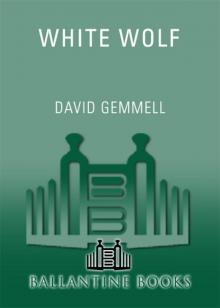 White Wolf
White Wolf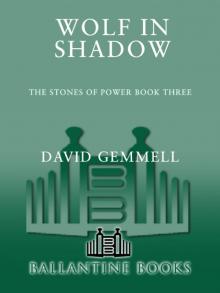 Wolf in Shadow
Wolf in Shadow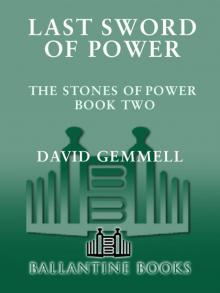 Last Sword of Power
Last Sword of Power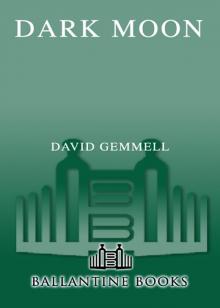 Dark Moon
Dark Moon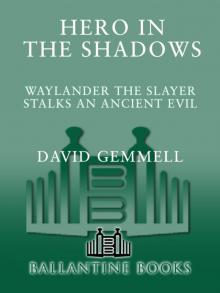 Hero in the Shadows
Hero in the Shadows Gemmell, David - Drenai 09 - Hero In The Shadows
Gemmell, David - Drenai 09 - Hero In The Shadows Waylander
Waylander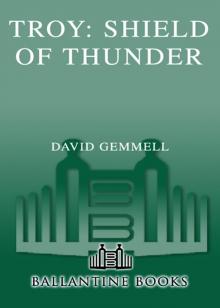 Shield of Thunder
Shield of Thunder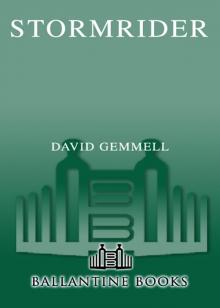 Stormrider Stormrider
Stormrider Stormrider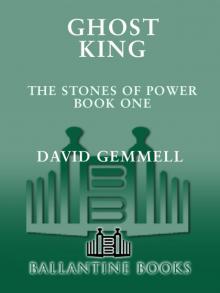 Ghost King
Ghost King Legend
Legend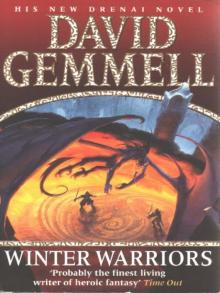 Winter Warriors
Winter Warriors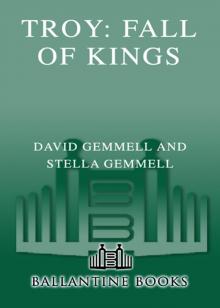 Fall of Kings
Fall of Kings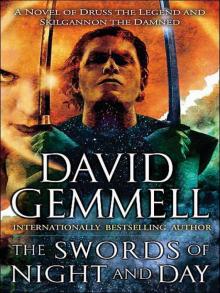 The Swords of Night and Day
The Swords of Night and Day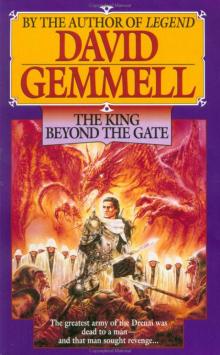 The King Beyond the Gate
The King Beyond the Gate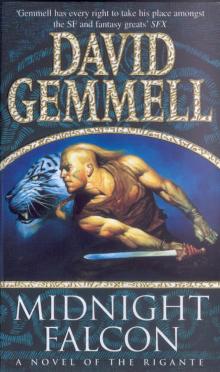 Midnight Falcon
Midnight Falcon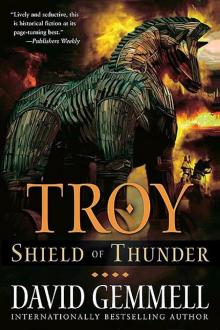 02 - Shield of Thunder
02 - Shield of Thunder In the Realm of the Wolf
In the Realm of the Wolf Ravenheart
Ravenheart The First Chronicles of Druss the Legend
The First Chronicles of Druss the Legend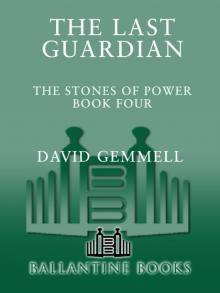 Last Guardian
Last Guardian Stormrider
Stormrider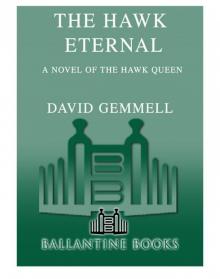 The Hawk Eternal
The Hawk Eternal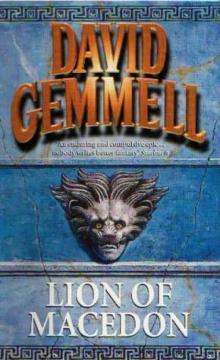 Lion of Macedon
Lion of Macedon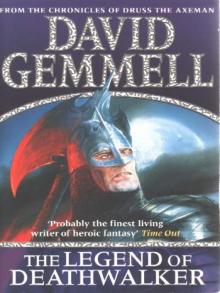 The Legend of Deathwalker
The Legend of Deathwalker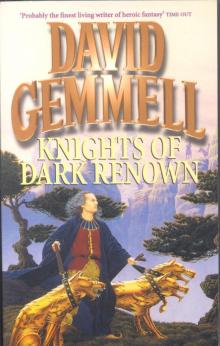 Knights of Dark Renown
Knights of Dark Renown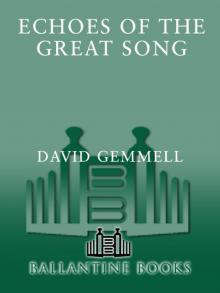 Echoes of the Great Song
Echoes of the Great Song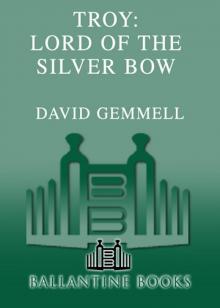 Lord of the Silver Bow
Lord of the Silver Bow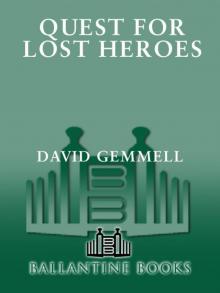 Quest for Lost Heroes
Quest for Lost Heroes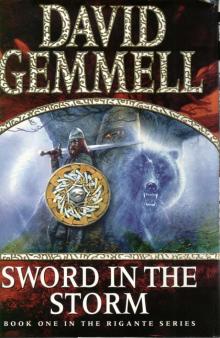 Sword in the Storm
Sword in the Storm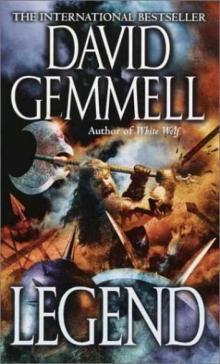 Drenai Saga 01 - Legend
Drenai Saga 01 - Legend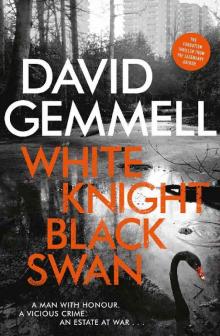 White Knight/Black Swan
White Knight/Black Swan![[Troy 02] - Shield of Thunder Read online](http://i1.bookreadfree.com/i/03/19/troy_02_-_shield_of_thunder_preview.jpg) [Troy 02] - Shield of Thunder
[Troy 02] - Shield of Thunder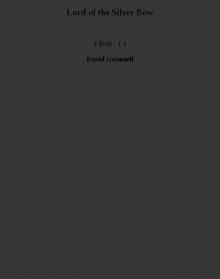 Lord of the Silver Bow t-1
Lord of the Silver Bow t-1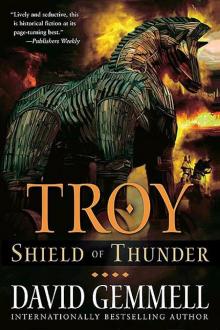 Shield of Thunder t-2
Shield of Thunder t-2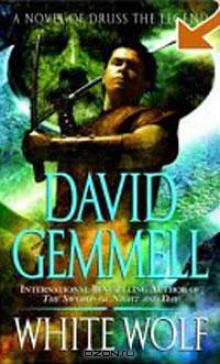 White Wolf: A Novel of Druss the Legend dt-10
White Wolf: A Novel of Druss the Legend dt-10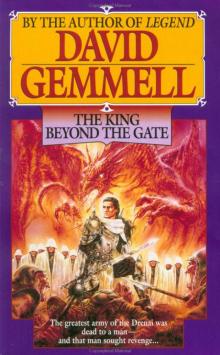 Drenai Saga 02 - The King Beyond the Gate
Drenai Saga 02 - The King Beyond the Gate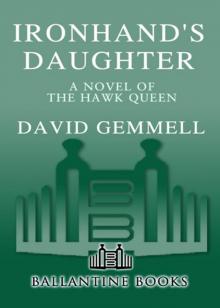 Ironhand's Daughter
Ironhand's Daughter Gemmell, David - Drenai 06 - The First Chronicles of Druss the Legend
Gemmell, David - Drenai 06 - The First Chronicles of Druss the Legend The Last Guardian
The Last Guardian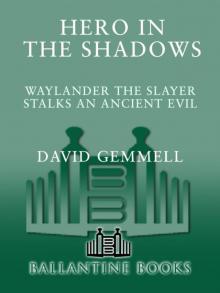 Hero in the Shadows: A Waylander the Slayer Novel
Hero in the Shadows: A Waylander the Slayer Novel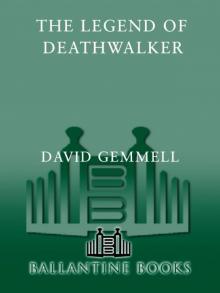 The Legend of the Deathwalker
The Legend of the Deathwalker